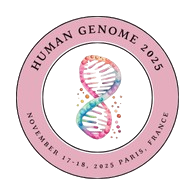Welcome Message
We are pleased and privileged to welcome you to the “18th International Conference on Human Genomics and Genomic Medicine”, taking place on November 17–18, 2025, in Paris, France. This year’s theme, “Towards a Healthier Future: Discover the Practical Applications of Genomics in Medicine”, highlights our shared commitment to advancing the field and improving global health through genomics.
The HUMAN GENOME 2025 conference offers a unique opportunity to connect with doctors, professors, scientists, geneticists, genomic specialists, educators, renowned speakers, researchers, and students from around the globe. It serves as a vibrant platform for sharing research insights and practical knowledge in the field of Human Genomics and Genomic Medicine. Join us for an inspiring and memorable scientific gathering, where the latest advancements and innovations in genomics will be unveiled and explored.
About Conference
The “18th International Conference on Human Genomics and Genomic Medicine” will be held from November 17–18, 2025, in Paris, France, under the theme “Towards a Healthier Future: Discover the Practical Applications of Genomics in Medicine”. This dynamic event will feature a wide array of activities, including keynote lectures, oral and poster presentations, exhibitions, panel discussions, and extensive opportunities for knowledge exchange.
This year’s program also invites you to participate in or organize engaging workshops, alongside innovative presentations and thought-provoking discussions. HUMAN GENOME 2025 is committed to delivering the latest insights and breakthroughs in human genomics and genomic medicine, while addressing on-going challenges in the field.
By attending, you'll gain valuable scientific knowledge, build meaningful collaborations, and be part of a global effort to drive progress in genomics research. Join us for a transformative experience at the forefront of human genomics and medical innovation.
Benefits of the registration:
-
Collaborating & networking with global researchers
-
Access to all sessions
-
Coffee break and lunch during the conference
-
Abstract book and conference material
-
Group registration discounts
-
Outstanding Young Researcher Award
-
Get your abstract published in the proceeding open access journal
-
International Speaker participation Certificate
-
Global exposure of your research on the conference website which has 100000+ Page views
Target Audience:
-
Medical Geneticists
-
Clinical Geneticists
-
Genetic Counsellors
-
Biopharmacists
-
Genetic Consultants
-
Genomic Students
-
Researchers
-
Associations and Societies
-
Genomics Faculty
-
Genomics Scientists
-
Genomics College Authorities
-
Pharmacology Scientists
-
Pharmacology Health Professionals
-
Genetics Associations and Societies
-
Business Entrepreneurs
-
Training Institutes
-
Business Entrepreneurs
-
Manufacturing Agricultural Devices Companies
Sessions & Tracks
Genomics is a multidisciplinary branch of biology focused on the structure, function, evolution, mapping, and management of genomes. A genome represents an organism's complete set of DNA, including all of its genes and their complex three-dimensional arrangement. By studying genes at this comprehensive level, genomics is revolutionizing our ability to predict, diagnose, and treat diseases with greater precision and personalization than ever before. A complete human genome contains approximately three billion base pairs of DNA.
-
Public health
-
Disinfection
-
Mendelian Phenotypes
A genetically modified organism (GMO) is a plant, animal, or microorganism whose DNA has been altered using gene-splicing techniques. While humans have been modifying organisms for thousands of years through selective breeding—shaping crops like corn and domesticating animals such as cattle and dogs to enhance desirable traits—modern genetic engineering allows for far more precise changes. In laboratory settings, scientists can directly modify genetic material to promote specific physiological traits or produce targeted biological products.
-
Genetic technologies
-
Genetic Coding
-
Genetic Modelling
Human genetics is a branch of biology that explores how traits are inherited and expressed across generations. Both genetics and genomics play vital roles in understanding health and disease. Genetics specifically focuses on the study of individual genes and how certain traits or conditions are transmitted from parents to offspring. It provides insights into the structure, function, and inheritance of all genes. In the context of genetic variations, such as the A-to-G mutation, there are three common genotypes observed: AA, AG, and GG. These variations can influence how individuals respond to diseases, treatments, and environmental factors.
-
Health
-
Generation
-
Complex Traits
Genomic vaccines are a new class of vaccines that use DNA or RNA to encode specific proteins. Once injected, these genetic materials enter human cells, which then produce the targeted proteins themselves. Compared to traditional vaccine production methods—such as growing proteins in cell cultures or eggs—this approach is often more efficient, faster, and cost-effective.
Conventional vaccines typically rely on inactivated or weakened pathogens, or proteins derived from those microorganisms, to stimulate an immune response. Similarly, many cancer vaccines use specific proteins to target tumor cells. In contrast, genomic vaccines represent a groundbreaking shift by using genes themselves as the basis for immunization, paving the way for significant advancements in both infectious disease prevention and cancer treatment.
-
Genes
-
Genomic Medicine
-
Colorectal Cancers
Epigenetic biomarkers are emerging as powerful tools for screening, early disease detection, prognosis, treatment monitoring, and predicting the risk of future disease development. In cancer, significant alterations in the epigenetic landscape play a key role in the onset and progression of malignancies. These changes include widespread DNA methylation modifications across the genome, along with shifts in post-translational histone modifications.
Such epigenetic disruptions affect multiple stages of tumor development, ultimately driving the selection and expansion of cancer cells with enhanced pathogenic potential. As our understanding of these mechanisms grows, epigenetic biomarkers are proving to be valuable assets in advancing personalized medicine and improving clinical outcomes.
-
Personalized Epigenetic Maps
-
Cardiovascular diseases
The concept of gene therapy is centered on addressing genetic disorders at their source. For example, if a mutation in a specific gene leads to the production of a dysfunctional protein—often resulting in a genetic disease—gene therapy aims to introduce a healthy copy of that gene. This healthy gene can then produce a functional protein, effectively compensating for the defective one.
This approach, known as gene replacement therapy, is being used to treat various inherited conditions, including hereditary retinal diseases, by restoring normal cellular function at the genetic level.
-
Heterogeneity
-
Heterogeneous gene-expression
Infectious diseases are disorders caused by organisms such as bacteria, viruses, fungi, or parasites. While many of these microorganisms naturally live in or on our bodies and are often harmless—or even beneficial—certain conditions can cause them to become harmful and lead to illness. Some infectious diseases are contagious and can be transmitted from one person to another, making prevention and control essential for public health.
-
Infectious Mononucleosis
-
HIV/AIDS
-
Giardiasis
-
Diphtheria
Bioinformatics is defined as the application of computational and analytical tools to the collection, analysis, and interpretation of biological data. It is a multidisciplinary field that integrates computer science, mathematics, physics, and biology to better understand complex biological systems.
Bioinformatics uses specialized software and algorithms for a wide range of purposes, including determining gene and protein functions, analyzing evolutionary relationships, and predicting the three-dimensional structures of proteins. By studying patterns within DNA and protein sequences—both within a single organism and across different species—bioinformatics helps uncover the functions of genes and proteins and provides insights into evolutionary biology.
-
Polymers
-
Personalized Genetic Medicine
Gene mapping is the process of identifying the specific location of a gene on a chromosome and determining the relative distances between genes. This technique helps pinpoint where a gene is situated within the genome and reveals how closely genes or genetic markers are linked, based on how frequently they are inherited together. Gene mapping plays a crucial role in understanding the organization of genes on chromosomes and is essential for studying genetic traits, inheritance patterns, and identifying genes associated with diseases.
-
X- Chromosomes
-
Y-Chromosomes
-
DNA Replications
Pre-implantation genetic diagnosis (PGD) refers to the testing of embryos or oocytes at the pre-implantation stage for genetic abnormalities. This technique has been developed primarily for couples at risk of passing on serious Mendelian disorders, structural chromosomal abnormalities, or mitochondrial diseases to their offspring. The past, present, and future advancements in PGD are closely linked to understanding the natural genetic makeup of pre-implantation embryos. PGD is considered an essential component of reproductive healthcare programs and is recognized as a valuable and effective alternative to traditional prenatal testing.
-
Clonal Cell lines
-
Heterogeneous Tumours
-
Cell Clusters
Pharmacogenomics is the study of how an individual’s genes influence their response to medications. This emerging field integrates pharmacology—the science of drugs—with genomics—the study of genes and their functions—to develop safer and more effective medications, as well as optimal dosages, tailored to a person’s genetic makeup.
-
Medication-Related Data
-
Electronic Medical Records
-
Telehealth
Bioinformatics analysis not only accelerates drug target identification and drug candidate screening and refinement but also aids in characterizing side effects and predicting drug resistance. Drug discovery and development is a complex, high-risk, time-consuming, and potentially highly rewarding process. Pharmaceutical companies often invest millions of dollars in bringing a single drug to market. Developing a new drug requires advanced technological expertise, skilled human resources, and substantial capital investment.
-
Computational Algorithms
-
Microbial Genome
-
Bioinformatics
Computational biology applies machine learning to study gene expression and its regulation. This branch of science combines computer technology and computational methods to model and understand the structures and processes of life. It also plays a key role in decoding and interpreting genetic information.
-
Gene Coding
-
Gene Mapping
-
Gene Computing
-
Gene Analytics
Genomics—particularly high-throughput sequencing and the characterization of expressed human genes—has opened new opportunities for drug discovery. Comprehensive knowledge of all human genes and their functions can enable effective preventive measures and transform strategies for drug research, discovery, and development.
-
Drug Delivery
-
Drug Usage
-
Precision Medicine
Genomic medicine is an emerging medical discipline that uses an individual’s genomic information as part of their clinical care—for example, in diagnostic or therapeutic decision-making—and considers the resulting health outcomes and policy implications of such use.
-
Simulation
-
Interactive learning
-
E-learning
-
Simulation-based learning
Personalized medicine is an emerging approach to healthcare that uses an individual’s genetic profile to guide decisions in the prevention, diagnosis, and treatment of disease. By tailoring care to each patient’s unique genetic makeup, personalized medicine is beginning to overcome the limitations of traditional treatments. Increasingly, it allows healthcare providers to shift the focus from reactive treatment to preventive care and to predict an individual’s susceptibility to certain diseases.
-
Breast Cancer Cells
-
Health Biomarkers
-
Precision Medicine
The study of cancer genomes has uncovered genetic abnormalities that drive the development and progression of various types of cancer. This knowledge has deepened our understanding of cancer biology and paved the way for new methods of diagnosis and treatment.
-
Morphology
-
Genomic Oncology
The goal of cognitive computing is to simulate human thought processes through computerized models. Using self-learning algorithms that incorporate data mining, pattern recognition, and natural language processing, computers can mimic the way the human brain functions.
-
Cognitive Models
-
Machine Learning
-
Artificial Intelligence
Genomic medicine is the study of our genes and their interaction with health. It explores how an individual’s genetic information can be used to improve clinical care and health outcomes—for example, through accurate diagnosis and personalized treatment.
-
Pharmacology
-
Immune Receptors
-
Nucleotide Polymorphism
Emergency medicine is the branch of healthcare focused on illnesses or injuries that require immediate medical attention. Emergency physicians are trained to treat patients of all ages with unexpected and often undifferentiated conditions.
Market Analysis
HUMAN GENOME 2025 is a premier platform for recognized and emerging scholars, healthcare professionals, geneticists, genomic specialists, researchers, academicians, industry experts, and scientists in the field of Human Genomics to exchange ideas, research, and developments in Human Genomics and Genomic Medicine. The primary aim of this meeting is to inspire and globalize innovative ideas and research for treatment, explore current market trends, and shape the future of genomic medicines, diagnostic tools, and operational devices, with a strong emphasis on new technologies that benefit the field of Human Genomics.
Genomic medicine is a branch of healthcare that applies genomic information to deliver personalized care. It involves studying an individual’s genetic makeup and understanding how it impacts their health and response to medications. Genomic testing provides valuable insights for diagnosing genetic disorders and creating targeted treatment plans. The global genomic medicine market has expanded rapidly in recent years and is projected to continue its strong growth.
The global genomic medicine market size is expected to reach approximately USD 123.9 billion by 2032, up from USD 26.8 billion in 2022, growing at a CAGR of 17% from 2023 to 2032.

This growth is driven by factors such as the rising prevalence of chronic diseases, advancements in genomic technologies, and the increasing demand for personalized medicine. The genomic medicine market encompasses a wide range of products and services, including genomic sequencing, genetic testing, and personalized treatment solutions.
The expansion is further fueled by the growing use of genomics in drug development and the adoption of advanced spatial genomics and transcriptomics technologies. Numerous clinical trials are underway to discover novel drugs through genomic research. Additionally, the increasing incidence of chronic conditions—such as cancer, cardiovascular diseases, and diabetes—has amplified the demand for genomic medicine within pharmaceutical and biotechnology industries.












